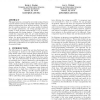Free Online Productivity Tools
i2Speak
i2Symbol
i2OCR
iTex2Img
iWeb2Print
iWeb2Shot
i2Type
iPdf2Split
iPdf2Merge
i2Bopomofo
i2Arabic
i2Style
i2Image
i2PDF
iLatex2Rtf
Sci2ools
ISSTA
2000
ACM
2000
ACM
OMEN: A strategy for testing object-oriented software
This paper presents a strategy for structural testing of objectoriented software systems with possibly unknown clients and unknown information about invoked methods. By exploiting the combined points-to and escape analysis developed for compiler optimization, our testing paradigm does not require a whole program representation to be in memory simultaneously for testing analysis. Potential e ects from outside the component under test are easily identi ed and reported to the tester. As client and server methods become known, the graph representation of object relationships is easily extended, allowing the computation of test tuples to be performed in a demand-driven manner, without requiring unnecessary computation of test tuples based on predictions of potential clients.
ISSTA 2000 | Objectoriented Software Systems | Software Engineering | Test Tuples | Unknown Clients |
Related Content
| Added | 01 Aug 2010 |
| Updated | 01 Aug 2010 |
| Type | Conference |
| Year | 2000 |
| Where | ISSTA |
| Authors | Amie L. Souter, Lori L. Pollock |
Comments (0)

